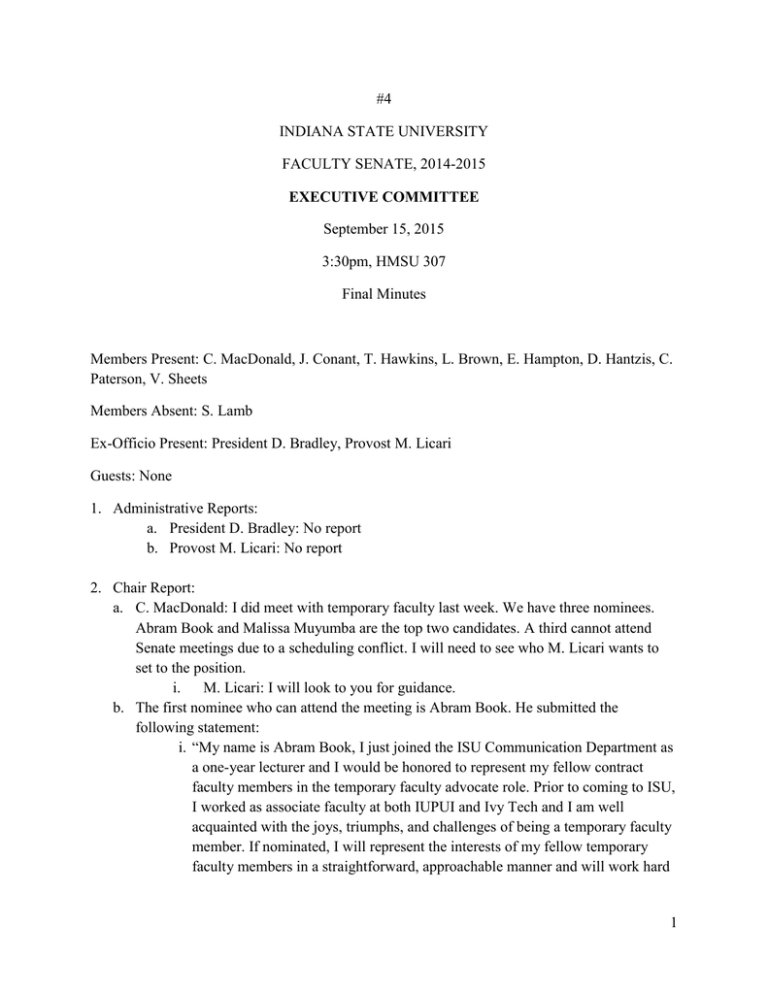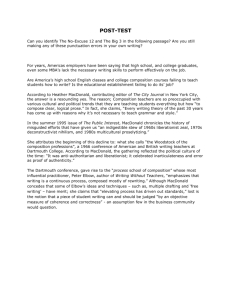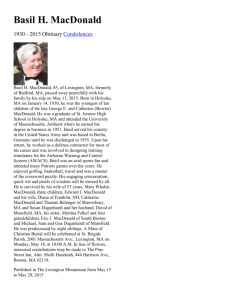#4 INDIANA STATE UNIVERSITY FACULTY SENATE, 2014-2015 September 15, 2015
advertisement

#4 INDIANA STATE UNIVERSITY FACULTY SENATE, 2014-2015 EXECUTIVE COMMITTEE September 15, 2015 3:30pm, HMSU 307 Final Minutes Members Present: C. MacDonald, J. Conant, T. Hawkins, L. Brown, E. Hampton, D. Hantzis, C. Paterson, V. Sheets Members Absent: S. Lamb Ex-Officio Present: President D. Bradley, Provost M. Licari Guests: None 1. Administrative Reports: a. President D. Bradley: No report b. Provost M. Licari: No report 2. Chair Report: a. C. MacDonald: I did meet with temporary faculty last week. We have three nominees. Abram Book and Malissa Muyumba are the top two candidates. A third cannot attend Senate meetings due to a scheduling conflict. I will need to see who M. Licari wants to set to the position. i. M. Licari: I will look to you for guidance. b. The first nominee who can attend the meeting is Abram Book. He submitted the following statement: i. “My name is Abram Book, I just joined the ISU Communication Department as a one-year lecturer and I would be honored to represent my fellow contract faculty members in the temporary faculty advocate role. Prior to coming to ISU, I worked as associate faculty at both IUPUI and Ivy Tech and I am well acquainted with the joys, triumphs, and challenges of being a temporary faculty member. If nominated, I will represent the interests of my fellow temporary faculty members in a straightforward, approachable manner and will work hard 1 c. d. e. f. g. h. i. j. k. l. m. n. o. to create additional opportunities for temporary faculty here at ISU. Thank you for the honor of being considered.” ii. Malissa Muyumba’ statement: “Ever since graduating from Indiana State with both my Bachelors and Masters degrees I have wanted to continue to be involved with the University. Years ago I taught as an adjunct for one semester and felt like an outsider. Currently teaching one section of Comm, that feeling hasn't subsided. After speaking with other temporary faculty, it appears to be a mutual feeling across the board. I want to know why and I want to work to fix this and other problems. We cannot continue to assist the University with its various goals if we cannot work together to bridge the gaps between full time and part time. For example, as a newly hired temporary faculty employee I have already had numerous questions that should have easily accessible answers, especially in this information age. However, they are not. I will work to fix these and other problems and issues, as I have a strong desire to do so. Please consider me for the Temporary Faculty Advocate.” E. Hampton: I’m really pleased with those two statements. One has a larger role as a full time faculty. One has a more typical role. Both can be beneficial. C. MacDonald: That’s true. C. Paterson: There’s only one position? C. MacDonald: One. D. Hantzis: Is there any compensation? C. MacDonald: Yes. L. Brown: I like the one who speaks of feeling like an “outsider.” I think that’s true especially if they are not here full time. I like someone who can speak to that position, if you are teaching one or two classes. D. Hantzis: L. Henson did a fine job. I know both these candidates, though I know Malissa more. I am concerned with putting someone in Senate who is brand-new. V. Sheets: Malissa, if I hear correctly, is only doing the one course this semester. I agree, her statement was great and she would be appropriate. Is it good to bring someone who may not be here next semester? D. Hantzis: Our department received a lot of funds to run sections of COMM 101 this semester, since all incoming freshmen are required to take it. Malissa has a lot of experience. C. MacDonald: M. Morahn said she would act as a resource for this person. D. Hantzis: I like the idea of someone who isn’t from here. Could we consider constituting an advisory group that would include all the people who have demonstrated their interest? C. MacDonald: That’s something I’m talking with M. Licari about. B. Guell has already begun to draft a formal selection process. We are also considering a viceadvocate or an alternate for this same reason. 2 p. D. Hantzis: If they are both willing to serve. q. C. MacDonald: We can have a back-up nominee in case they don’t get re-appointed. We would know who would step up. One would be an alternate. r. E. Hampton: It would make sense if the alternate could take over. s. V. Sheets: I like that idea. I feel as though both should get some kind of compensation. t. C. MacDonald: We could talk to Mike about that, especially if we just want them to attend Senate. It is hard to get faculty to daytime meetings. u. T. Hawkins: The advocate receives $1,000. v. C. MacDonald: That is for two semesters. w. D. Hantzis: Were the candidates at the meeting you went to? x. C. MacDonald: Malissa was. Abram was not. Am I hearing a desire to choose Malissa as the designee and Abram as the alternate? We are also discussing the idea of creating a website for temporary faculty, something that could include a FAQ. There’s a lot of information that isn’t well-known. y. C. MacDonald: It’s “IOB” Week. There will be spring and summer holds for those undergraduates who do not complete the training. Staff will not get raises. We need 100% compliance with this training. It is true that there will be no raises and no travel funds if you do not complete it. There will be no linkage to the Biennial Review, however. D. Bradley announced this position at the staff meeting last week. So far, much of the focus has been on students, but attention will turn to faculty. i. D. Hantzis: I don’t understand why the training is limited to one platform. If the goal is to get it done we should make it available in other formats. ii. L. Brown: Is it possible for chairs to receive a list of faculty who have completed the training? iii. D. Hantzis: M. Licari said that the software does not include any fields other than “name.” Right now the names are being manually sorted. There are hundreds of faculty. iv. C. MacDonald: I went to a meeting since then. They were talking as though chairs would receive a list. Chairs need to know so they can push their faculty. v. D. Hantzis: It will be very interesting to see how the holds will be managed in the spring when students are trying to register. 3. Approval of Minutes: a. Motion to approve as amended (E. Hampton, C. Paterson) Vote: 8-0-0 b. T. Hawkins: D. Hantzis submitted minor revisions. 4. Fifteen Minute Open Discussion a. D. Hantzis: I was really happy to hear about enrollment. It bothered me that the term “faculty” did not appear. The only college that has a “faculty” link on its webpage is 3 CAS. Drupal does not include Faculty anywhere on the website. There are links to academics, students, and people. The template makes it very difficult to find information. i. D. Bradley: That a function of faculty not being involved in the process. The homepage is truly external. You may be looking in the wrong places. ii. D. Hantzis: Students are looking for colleges in part because of faculty. I spend a lot of time meeting students as a faculty member. We need to emphasize this information. If colleges are not providing the links for faculty, where do we go for information? iii. D. Bradley: Those personal interactions are exactly what we are looking for. iv. C. MacDonald: I had done searching myself. It is difficult to find information on some of these sites. It’s like it was designed without faculty in mind. v. D. Hantzis: I’m a little frustrated. I am really proud of Arts and Sciences. They have a “Faculty & Staff” link. b. C. Paterson: I would like to talk about the Biennial Faculty Review. Due to the nature of my administrative appointment, and depending on the length of my supervisor report, I could be penalized with respect to my six-pages of attachments. I want to be able to present a rich description with evidence of what I do. I have less space due to the letter. i. C. MacDonald: I am putting a list together of things that need to be considered for the next Biennial Review. ii. D. Hantzis: How did it work last time, with the trial run? The chairs evaluation was separate last time. He wrote his on the form. iii. C. Paterson: The supervisor emailed an evaluation to the department chair, who was supposed to add it to the entirety. In some cases, the department chair did not attach it. At least in the last Biennial Review it didn’t count against the total number of pages. iv. C. MacDonald: This time it does, now that we’ve changed it. v. E. Hampton: That is a good point. Perhaps next time we can determine a set number of pages per category. vi. C. MacDonald: Or by how you rank them. vii. E. Hampton: That’s a good idea. viii. V. Sheets: I notice that teaching evaluations will be required for the next Biennial Review. That would take up multiple pages. It would be nice if we could find a way to condense that material so I don’t have to shrink everything down myself. ix. D. Bradley: Are we using the same time line? x. C. MacDonald: I think so. xi. C. Paterson: I think the process of seeking a dean’s exception for people who don’t want to rank teaching at the top has gone quite seamlessly in my college. I’m not sure if it is across the board. 4 C. MacDonald: I’m glad that’s going well. D. Hantzis: I volunteered to walk a few of my colleagues through the process. I think it’s an intimidating process, and it feels more high stakes than it is. They don’t understand the difference between the workload and the report. It’s not transparent. The system doesn’t explain itself. I’m going to walk them through the process again. c. D. Bradley: One last thing: please come to the stimulating Fall Address tomorrow. xii. xiii. 5. Additional Charges for Standing Committees a. C. MacDonald: I had a few thoughts. I would like FAC to examine the possibility of creating differentiated portfolios for the Biennial Review and for promotion. I still need to send a note to SAC and AAC to ask Institutional Research to create a data pool that is updated on regular basis. CAAC needs to continue to examine curricular obstacles towards graduation. i. D. Hantzis: I started looking at the approved changes to Section 310 in August. We could not review Section 305 until after the August meeting. There are substantive issues that need to be fixed. Section 310 is where, for example, we mandate the use of Blackboard. I have prepared a revision of that section after consulting with B. Guell. FAC will consider these revisions. b. C. MacDonald: Are there other thoughts? c. D. Hantzis: If the EAP issue is not resolved, it needs to go back to FAC. i. C. MacDonald: Officers did talk about that on Monday’s meeting with the provost. ii. L. Brown: What’s the EAP issue? iii. C. MacDonald: We intend for everyone who teaches on the campus to be evaluated by their peers. There are EAPs who teach as part of their contract or on top of their contract who are not being evaluated. iv. C. Paterson: As with UNIV 101? v. L. Brown: I have EAPs who are being evaluated vi. D. Hantzis: We are evaluating some, but not all of them. In some cases, only the chair participates in the review. I was associate dean for 11 years and was never evaluated. vii. L. Brown: Neither was I. viii. C. MacDonald: Do you have EAPs who are teaching as part of their contract? ix. L. Brown: Yes, but they do not have a lecturer contact. It’s my remedial math. x. D. Hantzis: If it isn’t clear, we should put it in the Handbook. xi. C. MacDonald: The intent is that everyone who is teaching will be evaluated by teaching colleges. I forwarded this problem to M. Licari. d. C. Paterson: You mentioned earlier about some benefits that temporary faculty don’t get. Should FEBC look at this and compare the benefits? 5 i. ii. iii. iv. v. vi. C. MacDonald: Yes. Access to the Student Rec Center was added. I bet many don’t know about this. D. Hantzis: Can we give more attention to faculty attrition? This is a lingering charge for FAC. 71% of the faculty who were hired seven years ago are not here. C. MacDonald: We have to open our searches in December. Another problem comes from the fact that we don’t automatically get failed searches back. And, there are workload issues we have to confront. C. Paterson: I agree this is important. C. MacDonald: M. Licari is trying to work on it. V. Sheets: Salary is not the problem it used to be. But it’s still an issue. 6. Liaison Reports: a. T. Hawkins (AAC): No report. E. Hampton will take over as liaison to AAC. b. C. Paterson (AEC): Met yesterday to elect officers. They are Brian Kilp, Mark Lewandowski, and Brendan Corcorran. c. L. Brown (CAAC): No report. d. V. Sheets (FAC): FAC is meeting right now. It is considering draft language on awards that might include instructors. B. Guell has also come up with sample anti-bullying language for consideration. e. S. Lamb (FEBC): No report. f. E. Hampton (GC): It meets tomorrow. T. Hawkins will take over as liaison to GC. g. D. Hantzis (SAC): They have established a monthly meeting time. h. J. Conant (URC): The first organizational meeting is scheduled. 7. Adjournment: 4:31 PM 6




